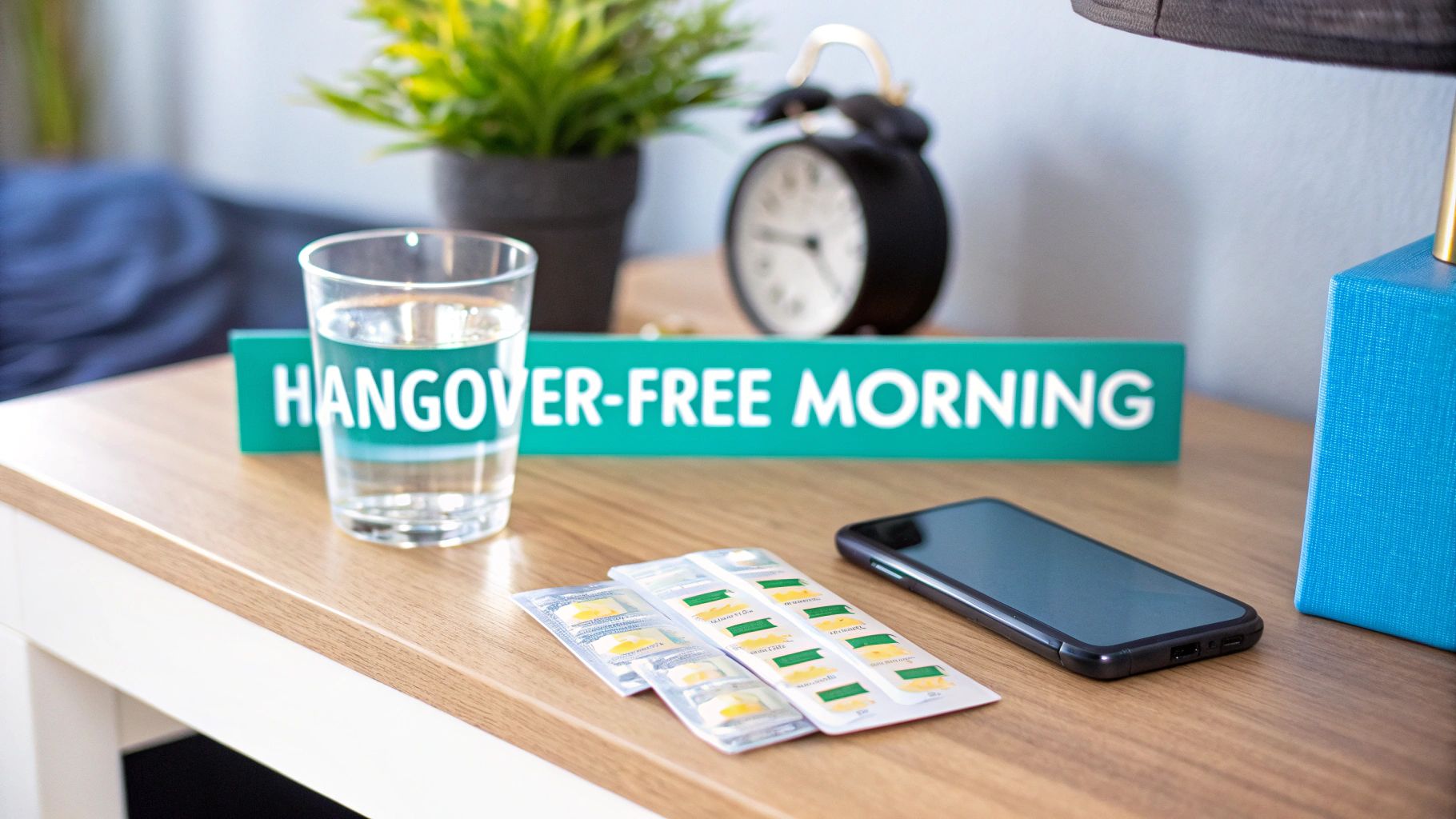

· By Annemarie
Your Guide on How to Prevent Hangover
Let's be real, the fear of the next day’s misery can easily cast a shadow over a great night out. Waking up to a pounding headache, waves of nausea, and that can’t-get-out-of-bed fatigue isn't just unpleasant—it can completely derail your day. But what if you had a simple, effective game plan?
The secret to a better morning isn't some magical cure, but a series of smart, conscious choices made before and during your evening. Think of it like prepping your body for a marathon, not a sprint. This guide gives you an immediate, actionable plan so you can actually enjoy your night without dreading the sunrise.
Your Blueprint for a Hangover-Free Morning
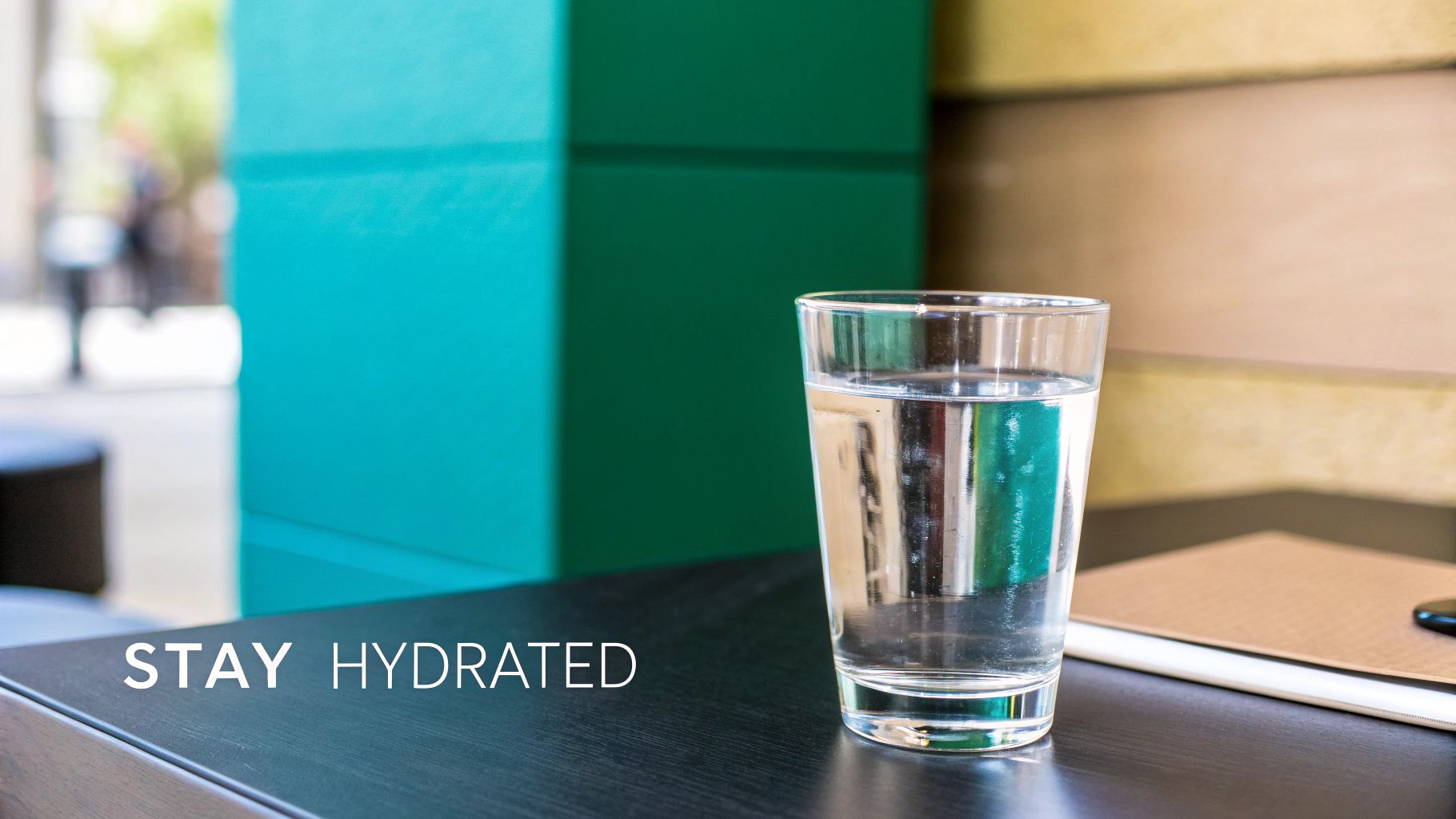
To dodge that hangover, you really just need to focus on three core strategies: strategic hydration, eating a balanced meal before your first drink, and pacing yourself. These simple, proactive steps give your body the tools it needs to process alcohol more effectively, which seriously cuts down the chances of a miserable morning.
Building Your First Line of Defense
The foundation of any solid hangover prevention plan comes down to a few non-negotiables. These aren't complicated rules, just fundamental habits that make a world of difference. Your body has a limited capacity to metabolize alcohol, and when you push past that limit, the consequences are pretty predictable.
By focusing on these core principles, you give your body a fighting chance:
- Hydration is Your Best Friend: Alcohol is a diuretic, which is just a fancy way of saying it makes you pee more. This leads to dehydration—a primary cause of headaches and that dreaded dry mouth. Counteracting this from the get-go is essential.
- Food as a Foundation: We've all been there—drinking on an empty stomach is a recipe for disaster. A solid meal acts like a buffer, slowing down how quickly alcohol hits your bloodstream.
- Pacing Over Gulping: Your liver can only process about one standard drink per hour. Mindful sipping and taking deliberate breaks are crucial for not overwhelming your system.
The most effective approach is a combination of managing consumption and staying hydrated. Research confirms that consuming water between alcoholic drinks and eating before you start drinking are proven ways to reduce the physiological stress that causes hangovers. You can explore further details on these global health insights about alcohol consumption on who.int.
Quick Hangover Prevention Checklist
To make it even easier, here’s a quick-reference table that sums up the most effective tactics. Keep these in mind as you plan your evening—your future self will thank you.
| Action | Why It Works | When to Do It |
|---|---|---|
| Eat a Balanced Meal | Slows alcohol absorption and stabilizes blood sugar. | 1-2 hours before your first drink. |
| Hydrate Proactively | Counters alcohol's diuretic effect from the start. | Throughout the day and right before going out. |
| Alternate Drinks | Keeps you hydrated and helps you pace yourself naturally. | Order a water with every alcoholic beverage. |
| Stick to One Drink Per Hour | Matches your liver's metabolic rate to prevent overload. | Throughout the entire evening. |
Think of this checklist as your pre-game ritual. A little planning goes a long way in ensuring your night is memorable for all the right reasons.
Strategic Preparation Before Your First Drink
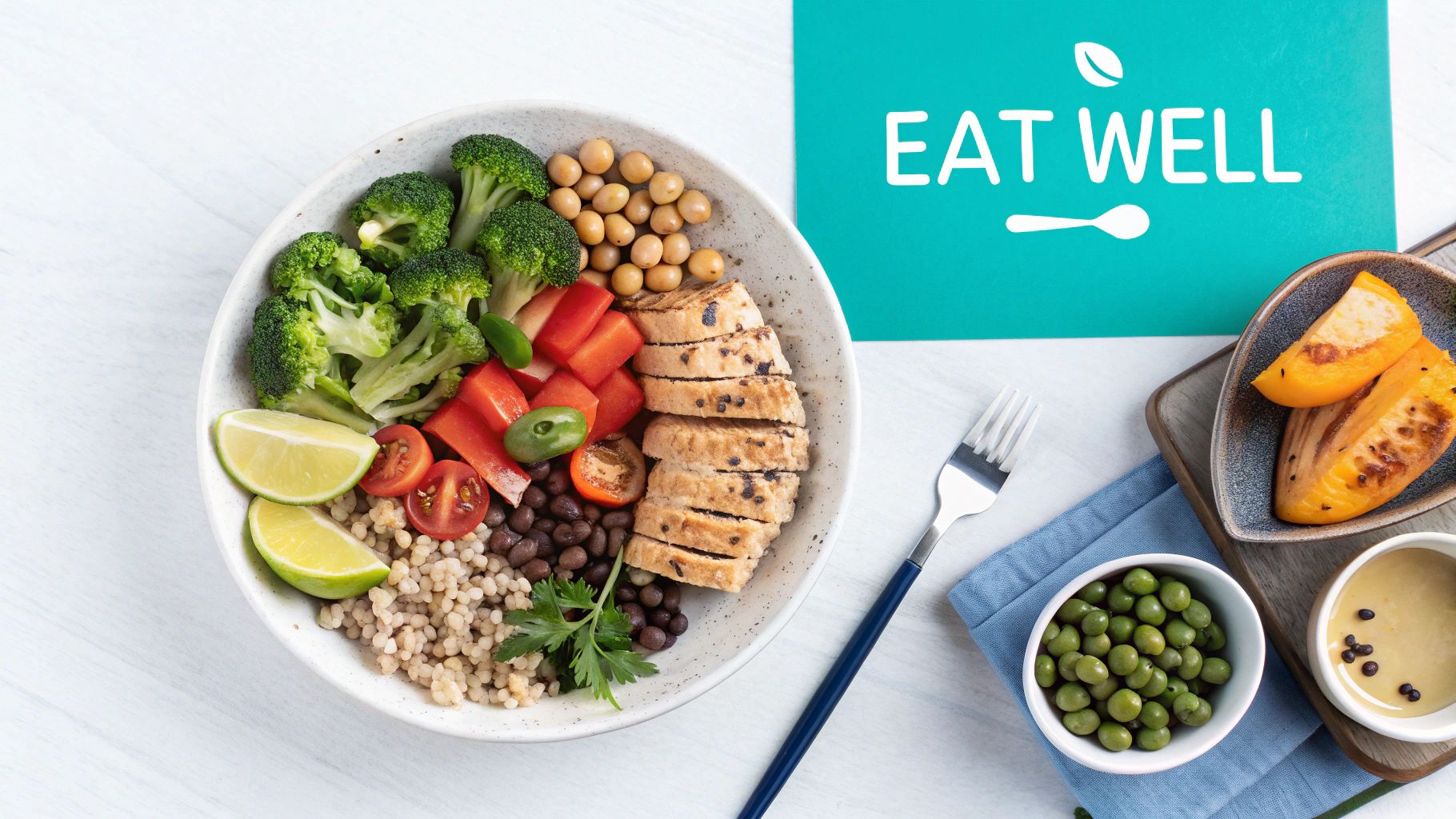
A good night often starts hours before you even think about your first drink. We’ve all heard the generic advice to "eat a big meal," but if you really want to sidestep a rough morning, your pre-drinking game needs to be a bit more intentional. Think of it as laying down a solid foundation. Without it, everything else you do to fight a hangover will be an uphill battle.
The whole point is to slow down how fast your body absorbs alcohol. When you drink on an empty stomach, alcohol hits your bloodstream like a freight train, completely overwhelming your liver. That rapid spike is what sets you up for a world of hurt the next day. But eating the right kind of meal beforehand creates a buffer, giving your body a fighting chance.
Fuel Your Body for Success
The perfect pre-drinking meal isn’t just about being full; it’s about a smart mix of macronutrients that work in your favor. You want to aim for a solid combination of healthy fats, lean proteins, and complex carbs.
- Healthy Fats: Think avocado, salmon, or a handful of nuts. Fats take a while to digest, which is great news for you because it seriously slows down how quickly alcohol leaves your stomach and enters your system.
- Lean Proteins: Things like chicken, fish, or tofu help you feel satisfied and keep your energy levels from crashing. Plus, protein gives your body the essential building blocks it needs to handle what's coming.
- Complex Carbohydrates: Go for options like quinoa, sweet potatoes, or whole-grain bread. These provide a steady release of energy and also help slow alcohol absorption without the sugar crash.
Something like grilled salmon with a side of quinoa and avocado about an hour or two before you head out is pretty much the gold standard. It’s not just about filling up; it’s about arming your body for the night ahead.
The Importance of Pre-Hydration
Just as important as food is starting the night properly hydrated. Alcohol is a diuretic, which is just a fancy way of saying it makes you pee a lot, flushing fluids from your system. If you’re already a bit dehydrated when you start drinking, you’re setting yourself up for failure.
Your body’s ability to handle alcohol is directly tied to your hydration and nutritional status. Showing up prepared is half the battle won.
It’s like trying to run a marathon without drinking any water beforehand—a terrible idea. Make a point to drink plenty of water throughout the day. Even just a glass of water right before that first beer or cocktail can make a surprising difference.
This proactive approach is a huge part of learning how to prevent hangover before the party even gets started. For a deeper look at all the effective strategies, you can explore our full guide on how to prevent a hangover and build out a complete game plan. Trust us, prepping your body with the right food and enough water isn't some minor trick—it's the single most important first step toward a much, much better morning.
Mastering Your Drink Choices and Pacing
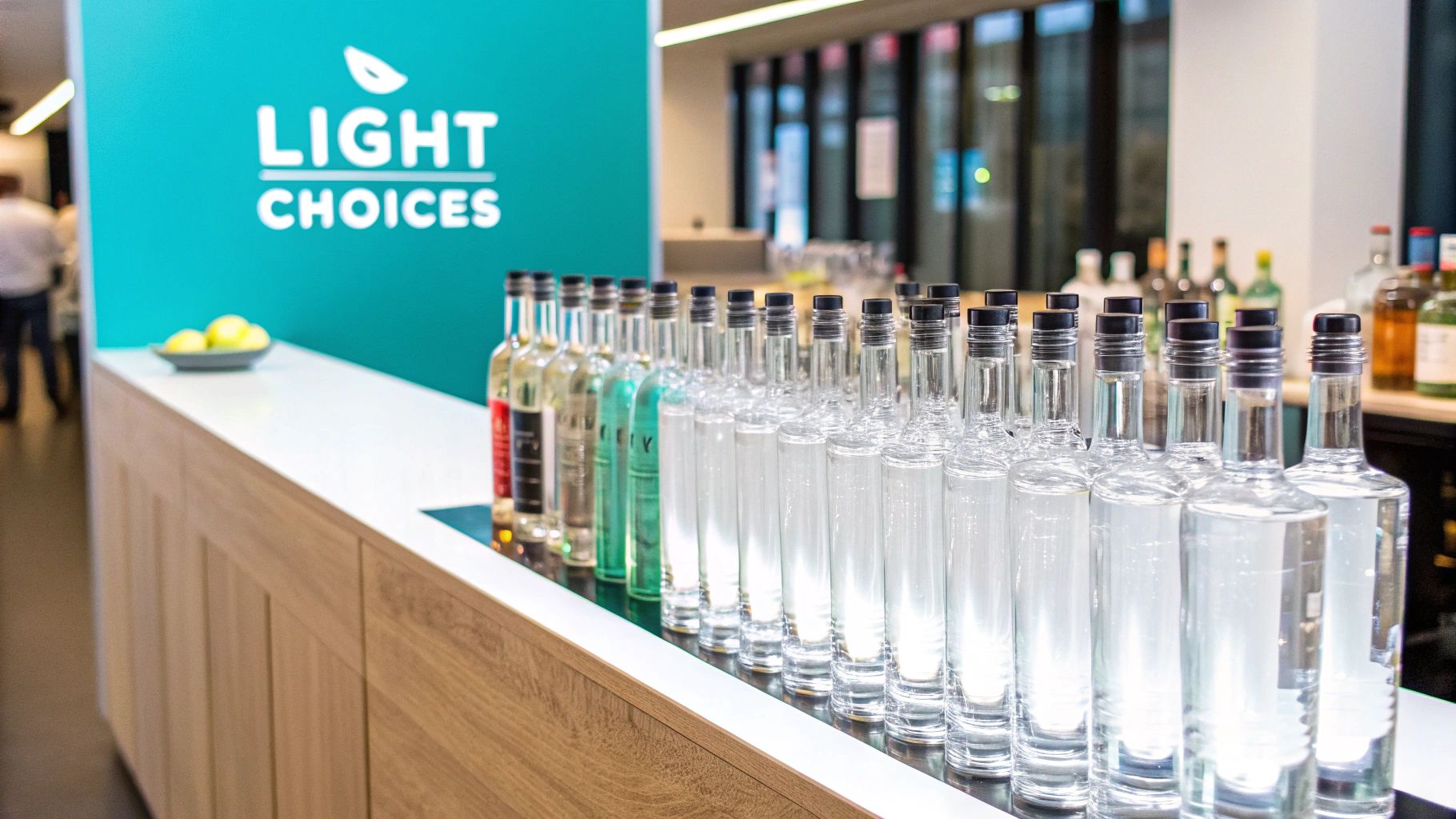
What you drink and how you drink it are just as important as the meal you ate beforehand. The type of alcohol you choose can have a massive impact on how you feel the next day, and it all comes down to something called congeners.
Congeners are chemical byproducts from the fermentation and aging process. They're what give many drinks their distinct flavor and aroma, but they're also a major culprit behind a nasty hangover. The rule of thumb here is pretty simple: the darker the drink, the higher the congener content.
Choosing Your Drinks Wisely
Think of it this way—your body has to process the ethanol plus all these extra compounds. More congeners mean more work for your liver, which often leads to that all-too-familiar pounding headache and queasy stomach.
So, when you're planning a night out, opting for lower-congener drinks is a seriously smart move. It's a simple switch that can make a world of difference.
- Low-Congener Choices: These are your clear spirits like vodka, gin, and white rum. Light beers and white wines are also much safer bets.
- High-Congener Culprits: Darker liquors are packed with them—think whiskey, bourbon, brandy, and tequila. Dark beers and red wines also have a much higher concentration.
This isn't to say you can never enjoy a good glass of whiskey again. But if you know it's going to be a long night, being mindful of its effects can help you make a smarter call. And remember, what you eat beforehand is just as critical. For a full rundown, check out our guide on what to eat before drinking alcohol.
A common mistake is thinking all alcohol hits the same. The reality is that congeners in darker drinks can dramatically intensify hangover symptoms. Choosing clear spirits is a practical, science-backed way to reduce the next-day misery.
The Art of Mindful Pacing
Beyond what you drink, how fast you drink it is a huge piece of the puzzle. Your liver can only metabolize about one standard drink per hour. When you drink faster than that, you're essentially creating a traffic jam of alcohol in your system. That backlog is what leads to a more brutal hangover.
One of the best and easiest strategies to remember is the one-for-one rule. For every alcoholic drink you have, follow it up with a glass of water. This simple habit works wonders for two reasons: it keeps you hydrated and it naturally slows down your drinking pace.
Picture yourself at a wedding or a party. Instead of heading right back to the bar for another cocktail, grab a water first. You’ll stay in the conversation, keep a drink in your hand, and give your body the time it needs to process everything. It’s not about restriction; it’s about finding a good rhythm so you can enjoy the whole night without paying for it tomorrow.
How to Fold Upside Into Your Drinking Routine
Okay, so we’ve covered the basics—pacing yourself and staying hydrated. These are the non-negotiables for preventing a brutal hangover. But what if you could give your body an extra layer of defense? A specialized toolkit to help it handle a night out?
This is where bringing in something like our Upside Hangover Sticks can be a real game-changer. Instead of just dealing with the pounding headache and nausea the next morning, you’re giving your body powerful, targeted support from the start.
So, What's Actually in These Things?
The real magic of Upside comes down to its powerhouse ingredients. We didn't just throw things at the wall to see what stuck; each component has a specific job to do.
- DHM (Dihydromyricetin): This is the star of the show. DHM is a natural plant extract that helps your liver break down alcohol and its nasty byproducts (like acetaldehyde) way faster. Lessening that load on your system is key.
- Milk Thistle: You've probably heard of this one. It's a classic herb famous for its liver-protective qualities. Since your liver is doing all the heavy lifting when you drink, giving it some love is a no-brainer.
- B Vitamins: Alcohol is notorious for draining your body of essential B vitamins, which are crucial for producing energy. Topping them up helps you fight that sluggish, completely wiped-out feeling the next day.
Think of it as a one-two punch: the ingredients help your body process the alcohol more efficiently while also replenishing the good stuff you lose along the way.
The infographic below gives you a solid visual for pacing your drinks, which is a perfect partner to the support Upside provides.
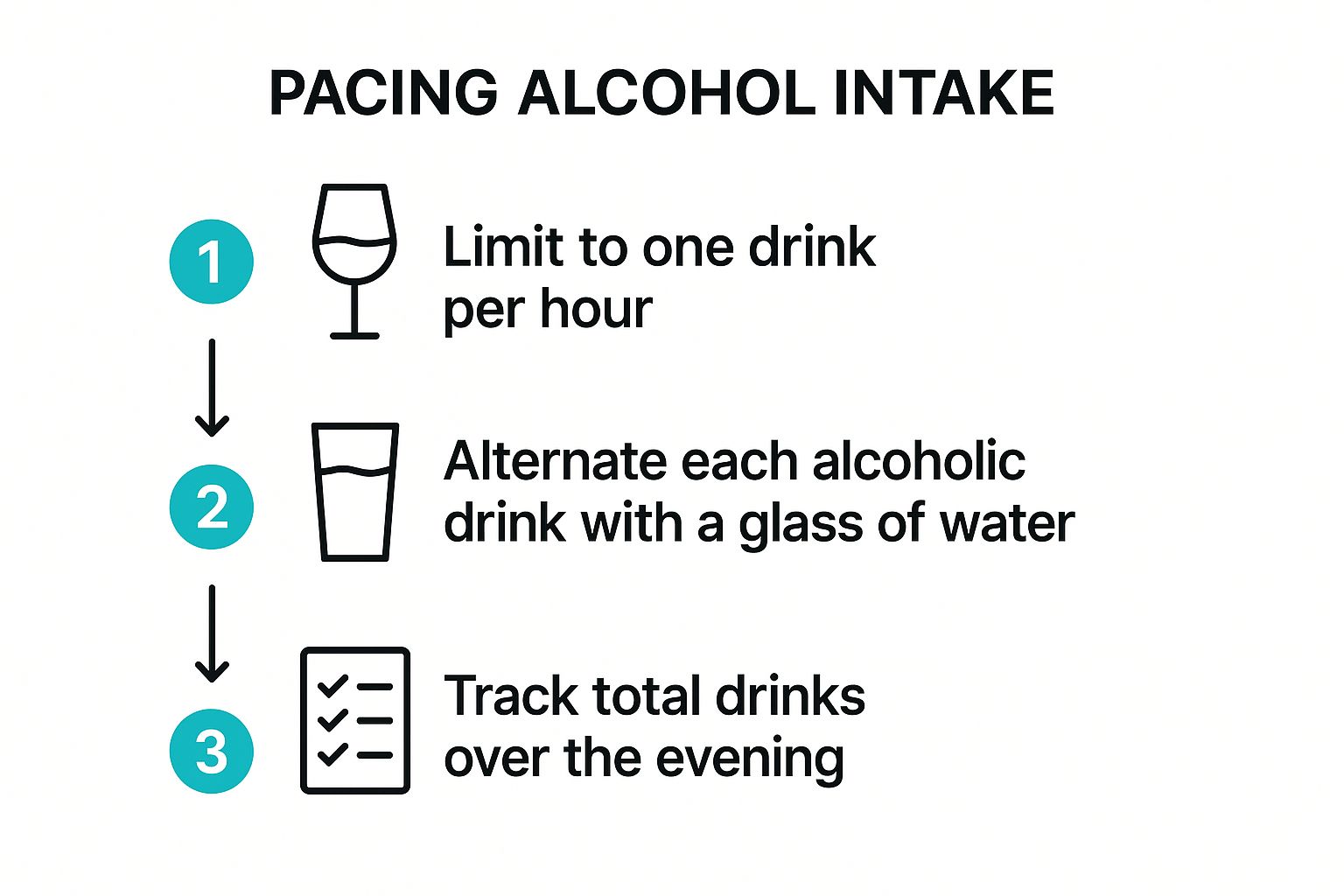
When you combine smart pacing with targeted support, you're setting yourself up for a much, much better morning.
The Best Way to Use Upside
Working Upside into your night is incredibly simple. It really just depends on what your plans are.
Pro Tip: For best results, take one Upside stick right before you start drinking. If you know it's going to be a long one—think weddings, all-day festivals, or a big holiday party—taking a second stick midway through will give your body that sustained support it needs.
Let's say you're heading out for happy hour with your team. Just grab an Upside stick and take it before you walk out the door. It's that easy. You're arming your body with the nutrients it needs before the first sip.
This kind of proactive thinking is becoming way more common. People are tired of sacrificing their entire next day for a few drinks. In fact, the market for hangover-prevention products hit $2.34 billion in 2023. That’s a massive shift towards smarter, more supportive solutions. You can read more about this growing trend over at grandviewresearch.com.
By making Upside a part of your pre-game ritual, you’re not just crossing your fingers and hoping for the best. You're actively planning for a great morning. It's a no-brainer addition to your responsible drinking toolkit.
Your End-of-Night Recovery Rituals
What you do after your last drink can be just as important as what you did before your first. The night isn’t truly over until you’ve checked off a few key recovery steps before your head hits the pillow. Think of these simple but powerful actions as your last line of defense in the battle for a better morning.
Your number one priority should be aggressive rehydration. We all know alcohol is a diuretic, which means it flushes water out of your system. But it also takes essential electrolytes with it. Chugging a big glass of water is a decent start, but honestly, you can do a lot better.
To really push back against those diuretic effects, you need to put back the electrolytes you’ve lost—minerals like potassium, sodium, and magnesium that are absolutely vital for everything from nerve to muscle function.
Smart Rehydration and Fuel
Instead of plain water, reach for a beverage that’s rich in electrolytes. A sports drink, some coconut water, or even a simple electrolyte powder mixed into your water will make a world of difference. This approach helps your body rebalance its fluid levels way more effectively than water alone, directly tackling one of the main culprits behind that pounding next-day headache.
Next up, a small, strategic snack. This is not the time for a greasy slice of pizza, which can be tough for your system to handle late at night. The real goal here is to stabilize your blood sugar. Drinking can cause your blood sugar levels to dip, which is a big reason you might feel shaky and weak in the morning.
A small, easily digestible snack can work wonders.
- A piece of whole-wheat toast with a bit of honey. The complex carbs give you sustained energy, and the fructose in the honey actually helps your body process alcohol faster.
- A banana. It’s packed with potassium, one of the key electrolytes you’ve been losing all night.
- A small bowl of oatmeal. This is super gentle on the stomach and helps absorb any alcohol that might still be lingering.
This final move helps ensure your blood sugar doesn't totally crash while you sleep, making for a much, much smoother wakeup.
I have to bust a major myth here: having a "nightcap" or another alcoholic drink to "help you sleep" is one of the worst things you can possibly do. All you’re doing is giving your liver more toxins to deal with and wrecking your sleep quality even further. It's a guaranteed recipe for a rough morning.
Final Steps Before Bed
This whole end-of-night ritual is becoming more and more common, and it’s part of a bigger trend toward being proactive about our health. For instance, the United States is currently the largest market for hangover cure products, which shows a huge consumer demand for solutions that combine liver support, rehydration, and nutrient replenishment. As people look for smarter ways to enjoy themselves, interest in these preventative strategies keeps growing. You can see more of the data behind this trend in these market insights about hangover cures on skyquestt.com.
By taking just a few moments to rehydrate properly and grab a smart snack, you're actively setting yourself up for success. For more great advice, check out our other tips to try to avoid a hangover after drinking. You’re closing out the night with intention, paving the way for a refreshed and productive day ahead.
Clearing Up Common Hangover Questions
Even with the best game plan, a few persistent myths always seem to pop up when we talk about dodging a hangover. Let's cut through the noise and tackle some of the most common questions I hear. We'll separate fact from fiction so you can fine-tune your strategy for a much better morning.
Will a Greasy Breakfast Actually Cure My Hangover?
We’ve all been told this one: the best way to soak up last night’s fun is with a big, greasy fry-up. It's a classic piece of hangover advice, but honestly, it’s mostly a myth. While it might feel incredibly satisfying at the moment, a heavy, greasy meal can easily irritate an already sensitive stomach, potentially making you feel even worse.
The time to eat a fatty meal was before you started drinking. Fats are great at slowing down alcohol absorption. The morning after, though, your body is crying out for easily digestible nutrients to start the recovery process, not a heavy meal that's a struggle to process. Your best bet is something simple like toast, a banana, or some eggs.
Can I Still Get a Hangover From Just Beer or Wine?
Absolutely. It's true that darker liquors like whiskey and bourbon are notorious for their high levels of congeners (those nasty chemical byproducts), but no type of alcohol gets you a completely free pass. Beer and wine, especially red wine, still contain congeners and, more importantly, they all contain ethanol—the main culprit behind your hangover.
At the end of the day, the total amount of alcohol you drink and how dehydrated you get are way more important than what's in your glass. Drinking too much of any alcoholic beverage can overwhelm your system and lead to a miserable next day.
A lot of people think certain drinks are "safe," but that’s just not how it works. The reality is, overconsumption of any alcohol will lead to a hangover. It all comes down to quantity and how your body handles it, not just your drink of choice.
How Much Water Is Really Enough to Prevent a Hangover?
There isn’t a single magic number, but a fantastic rule of thumb I always follow is the one-for-one method. For every alcoholic drink you have, chase it with a full glass of water. It’s a simple trick, but it does two crucial things: it directly fights off dehydration and it naturally helps you pace your drinking.
Don't forget to down a large glass of water right before you go to sleep, too. Your main goal is to replace the fluids you lost from alcohol's diuretic effect. If you wake up and your urine is dark yellow, that's a crystal-clear sign you didn't hydrate nearly enough.
Does a Cold Shower Actually Help?
The idea of a cold shower shocking you out of a hangover sounds great in theory, but it’s a temporary fix at best. Sure, the jolt of cold water might make you feel more awake and alert for a few minutes, but it does absolutely nothing to fix the root causes of your hangover.
A hangover is an internal problem. It’s a combination of dehydration, an electrolyte imbalance, and the toxic stuff left over from your body metabolizing alcohol. Cold water on your skin won't rehydrate you, help your liver process toxins, or magically restore lost sleep. It’s like putting a bandage on a broken arm—a surface-level solution for a much deeper issue.
By busting these myths, you can focus your energy on what actually works. A proactive strategy combined with the right support is the most effective way to make sure a great night doesn't steal your next day. Give your body the backup it deserves with Upside and wake up feeling your best.
